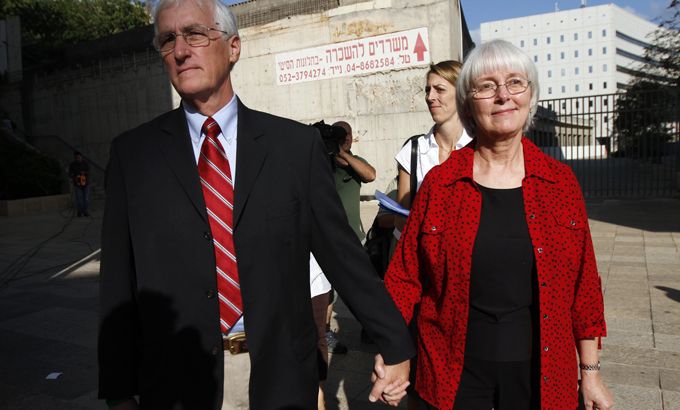
Has justice evaded Rachel Corrie’s family?
As a court rules that the activist’s death was an “accident”, we ask what this reveals about Israel’s legal system.
An Israeli court has ruled that the state was not at fault for the death of American activist Rachel Corrie in 2003.
|
“I was a combat soldier and we have a clear value: Purity of arms. And many times Israeli soldiers risk their lives in very difficult circumstances not to harm civilians … it did not work in this case, it doesn’t work in every case …. It is very easy to speak about war zones in a studio …. The Israeli army is one of the most moral armies in the world.“ – Efraim Inbar, a professor of political studies |
Corrie was killed by an Israeli army bulldozer while trying to obstruct the demolition of a Palestinian home on the border between Egypt and Gaza.
Her parents have accused the Israeli military of intentionally and unlawfully killing their daughter and have spent almost 10 years and more than $200,000 pushing for an admission of responsibility.
But after a civil case that lasted more than three years, an Israeli district court judge said Corrie’s death was a “regrettable accident” and that she had been protecting terrorists in a designated combat zone.
The Corrie family’s lawyer has said that they will appeal against the ruling to Israel’s Supreme Court and Cindy Corrie, Rachel’s mother, said of the verdict: “I believe that this was a bad day not only for our family, but a bad day for human rights, for humanity, for the rule of law and also for the country of Israel.”
|
“We notice there is a crisis in values and in the systematic investigation system itself and later on in the courts.“ -Jafar Farah, from an advocacy centre for Arab citizens of Israel |
So, is the verdict fair and transparent? And what does it tell us about how Israel’s legal system works?
To answer these questions Inside Story, with presenter Hazem Sika, is joined by guests: Jafar Farah, the director of the Mossawa Center, an advocacy centre for Arab citizens in Israel; Rami Khouri, an editor-at-large for Lebanon’s Daily Star newspaper, the director of the Issam Fares Institute for Public Policy and a professor at the American University of Beirut; and Efraim Inbar, a professor of political studies at Bar-Ilan University and a former paratrooper in the Israeli army.
|
“This is a situation which reminds virtually the whole world, except for a few die-hard supporters of Israel, that this is exactly what the people in Apartheid South Africa were saying: ‘That we have a good justice system and we put our prime ministers on trial.’ Of course the Israelis have a great justice system – for Zionists. But when dealing with Palestinians or other Arabs or people under their occupation they reject almost every bit of international law with a very, very minor occasional exception.” Rami Khouri, an editor-at-large for Lebanon’s Daily Star newspaper |
Other attempts to bring legal action against the Israeli military:
- In 2005, Israeli soldier Taysir Hayb was convicted of killing a British activist. He was released from prison in 2010, two years before completing his sentence of eight years. Hayb was the first Israeli soldier to be sent to jail for killing an activist.
- Activist Tristan Anderson was shot in the head in 2009 in the West Bank. He and his family have filed a civil suit against the Israeli military for the injury he sustained. However, the trial was postponed due to a last-minute revelation of material evidence.
- A Turkish court charged four senior Israeli military commanders over the killing of nine Turkish activists trying to reach Gaza in 2010.